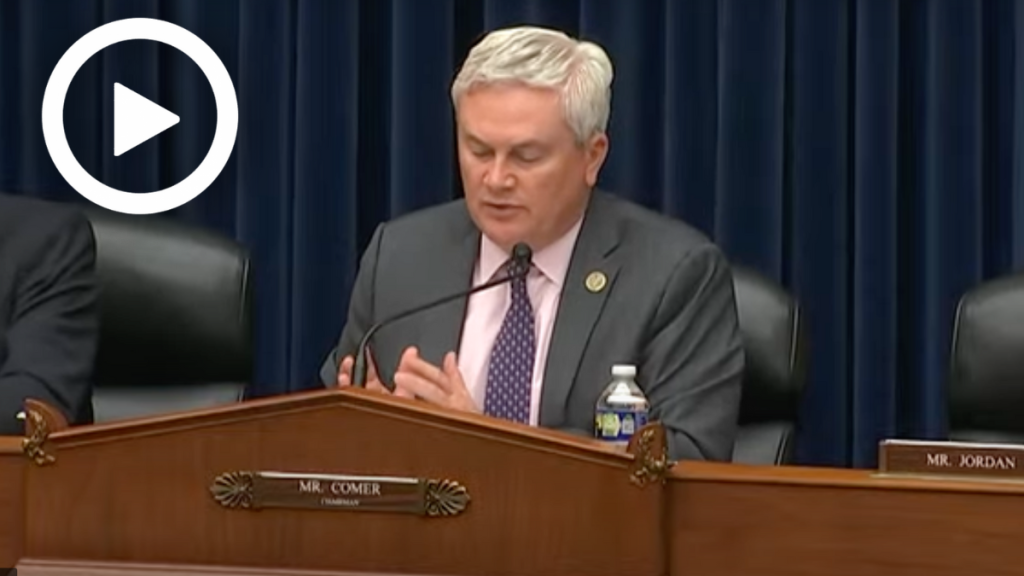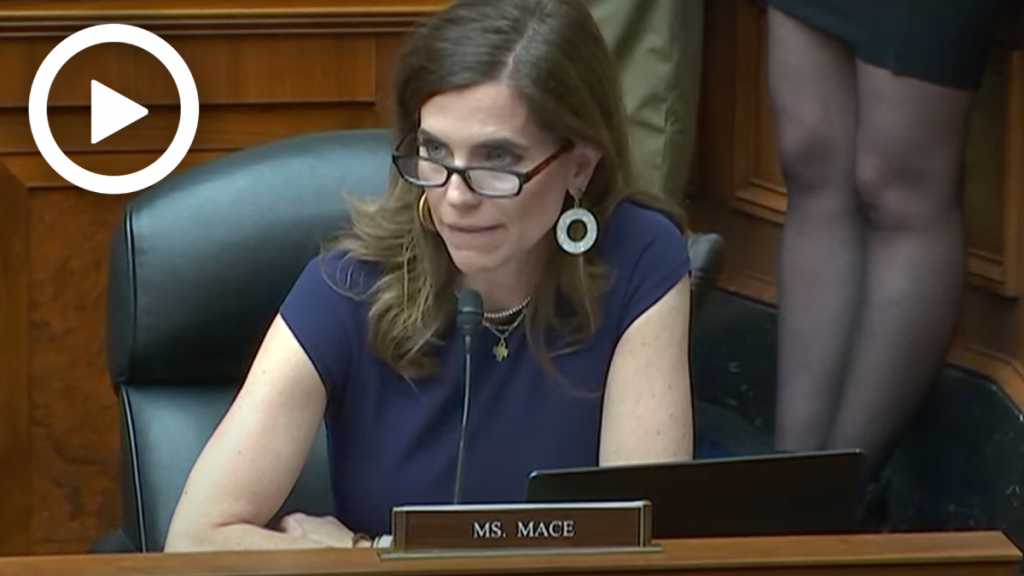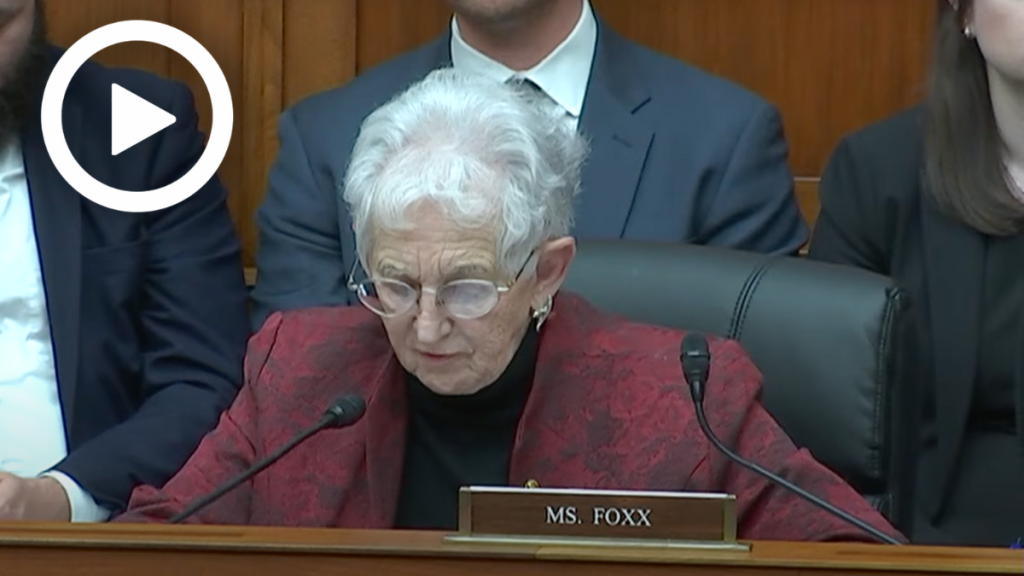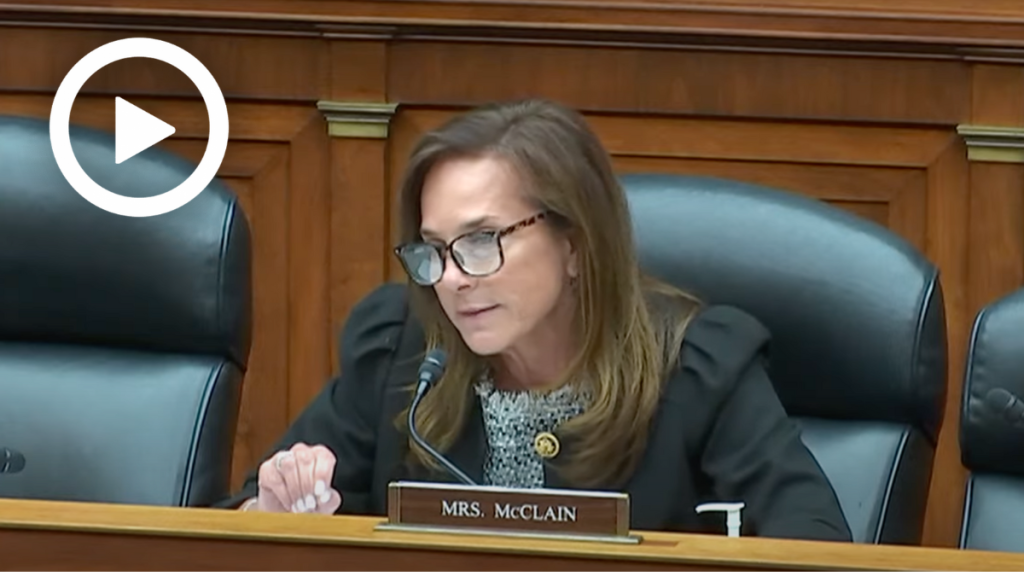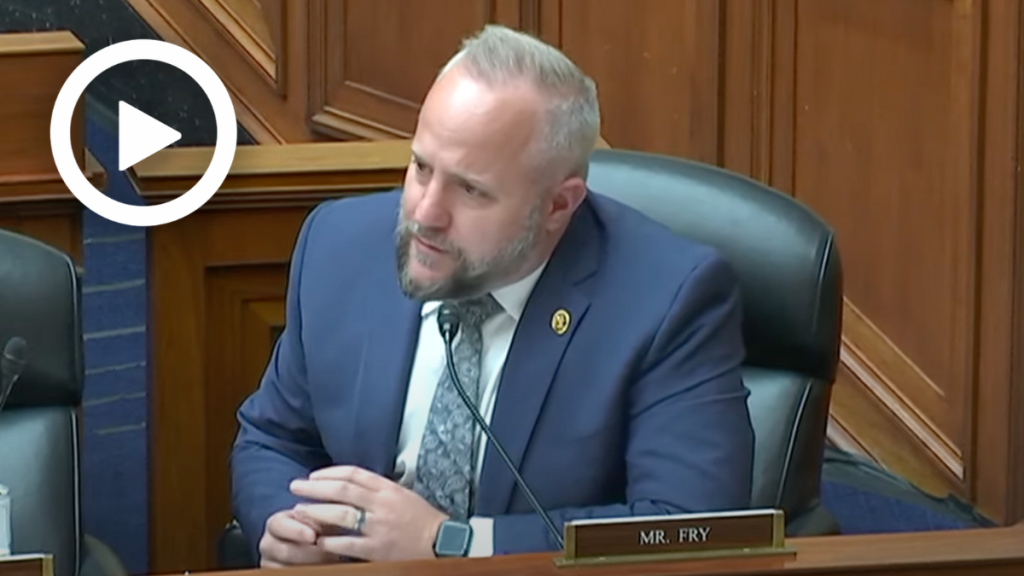Hearing Wrap Up: FDA Has Stumbled from Crisis to Crisis
WASHINGTON—The House Committee on Oversight and Accountability held a hearing titled “Oversight of the U.S. Food and Drug Administration.” At the hearing, lawmakers asked FDA Commissioner Robert Califf about a pattern of issues within the FDA to ensure the FDA is completing its role of regulatory oversight of the food and drug industries, prioritizing safety and effectiveness, and incentivizing innovation.
Key Takeaways:
Under the Biden Administration, the FDA has stumbled from crisis to crisis: the infant formula shortages, essential drug shortages, unsafe food, illicit Chinese tobacco products, and more.
- The FDA’s failure to prepare for and respond to the infant formula crisis in 2022 hurt families with babies due to significant shortages and the lack of availability of many specialty formulas.
- During the hearing, Subcommittee on Health Care and Financial Services Chairwoman Lisa McClain (R-Mich.) revealed documents obtained by the Oversight Committee confirm the Biden Administration knew about the infant formula crisis three months before taking action to address the crisis in May 2022.
- The FDA’s Center for Tobacco Products’ (CTP) ineffectual regulation of the manufacture, distribution, and marketing of tobacco products, including vapes and electronic cigarettes, has allowed illicit and unregulated similar products from China to infiltrate the U.S. market.
The FDA is not fulfilling one of its most important duties to ensure safety while encouraging innovation to provide better health care, more robust and stable food supplies, and products that reduce harm to consumers.
- The FDA has still not returned to pre-pandemic levels of inspections of foreign pharmaceutical manufacturing facilities, raising the risk for safety concerns in these facilities.
- During the hearing, Commissioner Califf told Chairman Comer that the FDA needs to pick up the rate of its foreign inspections.
Member Highlights:
House Committee on Oversight and Accountability Chairman James Comer (R-Ky.) asked about what Congress can do to encourage more essential pharmaceutical production to be manufactured in the United States and ensure illegal Chinese tobacco products do not flood the market.
Chairman Comer: “I think it’s safe to say the current regulatory process at the CTP is not at all what Congress envisioned when it passed the Tobacco Control Act 15 years ago. From the Reagan-Udall report you commissioned and recent court rulings, I have to conclude that those seeking to play by the rules don’t even know what the rules are because FDA won’t tell them.”
[…]
“Given what I just described, do you even want a functional regulatory process for these products or is it the objective to target the U.S. tobacco industry, even if it means allowing a flood of Chinese products containing God knows what into this country?”
Commissioner Califf: “[…] What was not even present when the initial law was passed that you referred to was the presence of vaping or e-cigarettes. No one anticipated there would be twenty-six million plus applications of vaping products. That is a bit overwhelming. […]
“It bothers me as much it does you to see what’s on our shelves. I do want you to know that we’ve really picked up our enforcement. Over six-hundred warning letters to manufacturers, hundreds of civil money penalties now, and we’ve also now begun to do injunctions…”
Chairman Comer: “How is the FDA working to keep foreign manufacturers accountable?”
Commissioner Califf: “As I’ve already established, we are doing a major reorganization because I agree with you that we need to pick up the pace of the inspections that we’re already doing.”
“Again, as I’ve already said, the first line of defense are the manufacturers themselves. Here’s where modernization of our data systems is important. The more we can keep up with what’s going on, not just in U.S. facilities but all around the world, the better we’re able to target our inspections and to have the frequency that’s needed to keep the manufacturers in shape.”
Chairman Comer: “In your opinion as Commissioner of FDA, what can we do in Congress to encourage an environment where all or much more of our essential pharmaceutical production is manufactured in the United States?”
Commissioner Califf: “For this [generic drug] area, it’s an area where we do need to reshore significantly.”
Chairman Comer: “It’s a national security issue as well.”
Commissioner Califf: “Absolutely. And when the raw material is coming from China, it’s an issue that we need to take seriously. […] We need to create an economic market situation where the price is fair so that the manufacture can produce a product but also invest in the technology of manufacturing and can be done using American labor, which is more expensive than labor in other countries.”
Rep. Nancy Mace (R-S.C.) discussed how the FDA’s failure to regulate cannabidiols (CBD) products as dietary supplements, which could allow dangerous products to come to market.
Rep. Mace: “Can you help me understand if the FDA will take on additional responsibilities or if your role will change as it relates to cannabis?”
Commissioner Califf: “This is a very complicated topic, but I’ll just say that remember, there are over thirty different forms of cannabis now different chemicals that are made. It falls in this area where state regulation has been dominant. This is an area where I believe we would be better off if we had guidance from Congress about how to proceed.”
Rep. Virginia Foxx (R-N.C.) noted that despite the FDA doubling the CTP’s staff, that have delayed approving pre-market tobacco product applications. The demand for these products has been filled by illicit products.
Rep. Foxx: “Stakeholder groups with pending pre-market tobacco product applications, or PMTAs, have been waiting for several years to a decision which far exceeds the 180-day review period written into law. […] Why has the CTP failed to comply with statutory review period despite the fact that the CTP’s staff has more than doubled in the last decade?”
Commissioner Califf: “Twenty-six plus million applications. We’re now 99 percent done and soon we will be within that timeframe.”
Rep. Foxx: “But you know among those applications are very frivolous applications. And there’s like a couple of dozen in there that are coming from legitimate places. You all should have focused your attention on those. It’s hard to believe that an agency that’s doubled its staff over a decade to over twelve hundred, receives over 700 million dollars per year in funding, is still not meeting the deadline for these PMTAs, the serious ones again. What performance metrics does the CTP have to ensure they’re being good stewards of the tobacco user fees?”
Commissioner Califf: “The numbers of applications, the time it takes to review them, the outcomes of the reviews are discussed by numerous watchdog groups that are looking at everything that we do.”
Rep. Foxx: What does the FDA doing to rectify this problem of illicit products in the market?”
Rep. Foxx: “I’d say we’re all in favor of reducing harm from tobacco. […] We have an increasing number of warning letters, civil money penalties, and injunctions now and seizures now at places of import. It is a very large number of products. There’s no question about it.”
Rep. Lisa McClain (R-Mich.) revealed that the Biden White House knew about the infant formula crisis months before President Biden took action in 2022.
Rep. McClain: “Mr. Chairman, I’d like to enter into the record two internal email exchanges within the FDA. The first dated February 4th 2022 in which the FDA officials are discussing the potential for infant formula supply issues and asking for immediate support from the White House to educate the public. The second, on February 19th of 2022, in which the FDA officials were discussing the supply issues that were already happening. Despite these discussions within the FDA, media reports said the President was not aware of the problem even though it was headlining in nearly every news channel and every paper across the country for three months. My question is: Did the FDA not raise concerns about the potential shortage even before the recall.”
Commissioner Califf: “I can’t speak for before the recall but at about the time of the recall.”
Rep. McClain: “The FDA did in fact raise the issues to at least nine different White House officials and President Biden took no action.”
Rep. McClain: “Why did it take three months for President Biden to invoke the Defense Protection Act?”
Commissioner Califf: “I can’t speak for President Biden and that particular decision. […] This evolved over time so the exact time of when the DPA should have been brought in is something that’s a matter of discussion.”
Rep. McClain: “Either the FDA didn’t tell him, or he didn’t act. Which is it?”
Commissioner Califf: “I think you have the emails, and I can’t really comment beyond that.”
Rep. Russell Fry (R-S.C.) asked about the FDA’s failure to provide American consumers access to products “appropriate for the protection of public health.”
Rep. Fry: “Does CTP still believe in the continuum of risk of nicotine products and does that FDA think it’s helpful for adult smokers who would otherwise continue smoking cigarettes to switch from combustible cigarettes to smoke free alternatives?”
Commissioner Califf: “There’s not a yes or no answer to that because for adults, the best thing to do is to stop using tobacco products altogether.”
Rep. Fry: “I think the concern that I have sir and the concern that many people share is there seems to be an abandonment of a congressional not only intent, a directive, that we’re going to pursue harm reduction as an actual strategy in the country. If you have 900 cigarettes that have been approved and only a handful of vape or other products, that seems to be divergent to what Congress has outlined for your agency. Would you not agree with that?”
Commissioner Califf: “I’m not familiar with the 900 term, sir. I’d have to go back and look at that. We have not abandoned the idea that the company should show that it can successfully transition people from combustible tobacco to vaping in a way that does not increase the risk of teenagers of getting addicted to nicotine and therefore being susceptible to tobacco.”
READ MORE: Comer: The FDA Has Failed to Prioritize Safety and Incentivize Innovation
